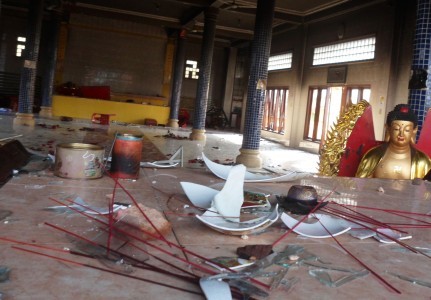Popular Reads
Top Results
Can't find what you're looking for?
View all search resultsPopular Reads
Top Results
Can't find what you're looking for?
View all search resultsMeiliana verdict demonstrates blasphemy law's 'injustice toward minorities'
Tony, a fellow resident of the city, said Meiliana's sentence was overly harsh compared to those received by the rioters.
Change text size
Gift Premium Articles
to Anyone
T
he blasphemy conviction of Meiliana, a Buddhist resident of Tanjung Balai, North Sumatra, for complaining about the volume of adzan (call to prayer) revealed the law's unfairness toward minorities, residents and activists said.
The Medan District Court found Meiliana, 44, guilty of blasphemy under articles 156 and 156a of the Criminal Code on Tuesday and sentenced her to 18 months' imprisonment.
She reportedly said that the adzan was "too loud" and it "hurt" her ears in July 2016, triggering an anti-Chinese riot in which offended Muslims burnt several Buddhist temples in Tanjung Balai.
Tony, a fellow resident of the city, said Meiliana's sentence was overly harsh compared to those received by the rioters.
"Meiliana is punished with 18 months, while the vihara desecrators were only punished with two months, while some were even freed. This is unjust," he told The Jakarta Post on Wednesday. "The law is not on the side of us minorities."
Institute for Criminal Justice Reform (ICJR) executive director Anggara echoed Tony's sentiments and urged the government to revoke the blasphemy article.
"Once again the blasphemy articles [are used] to attack minority groups," Anggara said in a statement on Wednesday. "From ICJR's records, the blasphemy articles are always used in a context where the defendant is considered to insult the majority religion."
He added that the revision of the blasphemy articles in the draft Criminal Code bill currently being deliberated in the House of Representatives were even more vulnerable to abuse.
"Articles on blasphemy have to be formulated very carefully because they are closely tied to the subjective whims of the majority," he said. (ahw)










